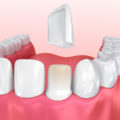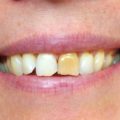Porcelain veneers have become a popular choice for individuals looking to enhance their smile. Crafted from thin, custom-made shells of porcelain, these veneers are expertly bonded to the front surface of the teeth, delivering a seamlessly natural and aesthetically pleasing appearance.
However, as with any dental procedure, it’s crucial to delve into the longevity of porcelain veneers. How long can you expect them to last? This article aims to unravel the intricacies of the factors influencing the lifespan of porcelain veneers, drawing comparisons with alternative veneer options, and offering valuable tips on maintaining their enduring charm.
Explore the nuances of porcelain veneer durability, gain insights into their comparative advantages, and discover practical tips for preserving their longevity. Armed with this knowledge, you’ll be equipped to make informed decisions about your dental health, ensuring a confident and enduring smile that stands the test of time.
Understanding the Lifespan of Porcelain Veneers: How Long Do They Last
The lifespan of porcelain veneers is dependent on various factors, making it challenging to provide a definitive answer on how long they last. However, patients need to understand their longevity when considering this cosmetic dentistry procedure.
Porcelain veneers are thin shells that are custom-made to fit over the front surface of the teeth. They are designed to improve the appearance of teeth that are discolored, chipped, or misaligned. While they are a popular choice for enhancing smiles, it is essential to consider their durability.
On average, porcelain veneers can last between 10 and 15 years. However, this timeframe can vary depending on several factors such as oral hygiene, biting forces, and the patient’s lifestyle habits. Maintaining good oral health by brushing and flossing regularly and visiting the dentist for regular check-ups can help prolong the lifespan of porcelain veneers.
It’s important to note that porcelain veneers are not permanent, and they may need to be replaced over time. Additionally, factors such as teeth grinding or clenching, which can put excessive pressure on the veneers, may lead to their premature failure. Composite veneers, which are made from a resin material, tend to have a shorter lifespan compared to porcelain veneers.
Comparing Lifespans: Porcelain Veneers vs Other Types of Veneers
Porcelain veneers are known for their durability and longevity. On average, porcelain veneers last between 10 to 15 years, although some may last even longer with proper care and maintenance. The lifespan of veneers can vary depending on the material used and how well they are taken care of.
Resin veneers, also known as composite veneers, are another type of veneer commonly used in dental procedures. While resin veneers are more affordable and can be placed on the teeth in a single visit, they generally have a shorter lifespan compared to porcelain veneers. On average, resin veneers last around 5 to 7 years before they may need to be replaced.
Other factors that can affect the lifespan of veneers include the health of the natural teeth, oral hygiene practices, and habits such as teeth grinding or biting on hard objects. It is important to note that veneers are not considered a permanent solution and will eventually need to be replaced.
The Porcelain Veneer Procedure: How It Affects Longevity
To maximize the longevity of porcelain veneers, it is crucial to adhere to a meticulous and precise porcelain veneer procedure. The longevity of porcelain veneers is influenced by various factors, including the material used, the procedure followed, and the patient’s oral hygiene practices. Porcelain veneers are known for their durability and can last anywhere from 10 to 20 years with proper care.
During the porcelain veneer procedure, the dentist removes a thin layer of enamel from the front surface of the tooth to make room for the veneer. They then take impressions of the teeth and send them to a dental laboratory, where the veneers are custom-made. Once the veneers are ready, the dentist will bond them to the teeth using a special adhesive. This procedure requires skill and precision to ensure a proper fit and natural appearance.
It is important to note that the longevity of porcelain veneers can be affected by factors such as teeth grinding, oral habits like nail biting, and poor oral hygiene. These habits can put excessive pressure on the veneers and lead to chipping or cracking. Regular dental check-ups, proper oral hygiene practices, and avoiding habits that can damage the veneers can significantly extend their lifespan.
Factors That Determine How Long Porcelain Veneers Last
Several factors help determine the lifespan of porcelain veneers. One of the most significant factors is the quality of the materials used. Porcelain veneers are known for their durability and longevity compared to resin veneers. While resin veneers are more affordable, they tend to have a shorter lifespan and may require replacement sooner.
The length of time the veneers last also depends on how well they are cared for. Proper oral care, including regular brushing, flossing, and dental check-ups, is essential for maintaining the veneers’ integrity. It is important to avoid habits that can damage the veneers, such as biting on hard objects or using the teeth as tools.
The type of adhesive used to bond the veneers to the tooth also plays a role in their longevity. Composite resin is commonly used for veneers, as it provides a strong bond. However, advancements in dentistry have introduced new materials and techniques that can extend the lifespan of veneers even further.
Maintaining Your Porcelain Veneers: Tips to Ensure They Last Long
Proper maintenance is crucial for prolonging the lifespan of your porcelain veneers. While porcelain veneers can last anywhere from 10 to 20 years, it is important to take proper care of them to ensure they last as long as possible. Here are some tips to help you maintain your porcelain veneers and keep them looking their best.
First and foremost, practicing good oral care is essential. Brush your teeth at least twice a day and floss daily to remove plaque and prevent dental issues. Use non-abrasive toothpaste to avoid scratching the surface of your veneers.
Avoid using your teeth as tools to open packages or bite into hard objects. Porcelain veneers are strong, but they can still chip or crack if subjected to excessive force.
Regularly visit your cosmetic dentist for check-ups and cleanings. They can assess the condition of your veneers and address any issues before they become more serious. Additionally, professional cleanings can help remove any stains or discoloration that may occur over time.
Be mindful of your diet and avoid foods and drinks that can stain your teeth, such as coffee, tea, and red wine. If you do consume these beverages, rinse your mouth with water afterward.
When to Replace Your Veneers: Recognizing the Signs
Recognizing the signs of when to replace your veneers is crucial for maintaining your oral health and the longevity of your smile. While porcelain veneers are known for their durability, they are not invincible and will eventually need to be replaced. The lifespan of porcelain veneers can vary depending on various factors such as oral care, oral habits, and the quality of the veneers themselves.
On average, porcelain veneers last between 10 to 15 years. However, with proper oral care and regular dental check-ups, they can last even longer. It’s important to note that resin veneers, which are a more affordable option, generally have a shorter lifespan of around 5 to 7 years.
Several signs indicate it may be time to replace your veneers. If you notice any cracks, chips, or discoloration on your veneers, these are clear indications that they need to be replaced. Additionally, if your veneers become loose or start to detach from your teeth, it’s important to schedule an appointment with your dentist to have them replaced.
In some cases, veneers would need to be replaced if there are underlying issues with the teeth they are covering. For example, if you develop tooth decay or gum disease, it may be necessary to remove the veneers and address the underlying oral health concerns before placing new veneers.
Ultimately, the decision to replace your veneers will depend on your dentist’s recommendation after a thorough examination of your oral health. Regular dental appointments and good oral hygiene practices are key to ensuring the longevity of your veneers and maintaining your overall oral health. If your veneers are nearing the end of their lifespan, your dentist may recommend other options such as dental implants or crowns to restore your smile and oral health.
Conclusion
The treatment option of porcelain veneers offers a significant improvement in a patient’s smile and oral health, but understanding their lifespan is crucial. While veneers, including both composite and porcelain types, are not permanent solutions, they are a long-term investment in cosmetic dentistry. Patients considering veneers should be aware that factors such as the health of dental enamel and the type of veneer – be it resin veneers, composite veneers, or traditional porcelain – play a critical role in determining how long veneers last. It’s important to recognize that while composite resin veneers may be a viable option, they differ in longevity and appearance from porcelain veneers.
Regular appointments with a dentist and a commitment to oral health are essential in extending the lifespan of any veneers. Dental professionals can provide more detailed information on how different veneers, including composite and porcelain, impact tooth enamel over time. For those looking to close gaps or improve their smile, options such as dental implants, crowns, and various forms of cosmetic dentistry should be explored. Booking an appointment to learn more about these options and to determine the best course of treatment is a key step. Ultimately, whether choosing implants, crowns, or veneers, dental health, and the patient’s specific needs should guide the decision, ensuring a beautiful smile and healthy teeth for as long as possible.
How long do porcelain veneers last? Porcelain veneers have a long lifespan and can last for many years if properly maintained. Compared to other types of veneers, porcelain veneers tend to be more durable and resistant to staining.
The longevity of porcelain veneers is affected by various factors, such as oral hygiene, habits, and the skill of the dentist. Regular maintenance and replacing them when necessary are key to ensuring that porcelain veneers last as long as possible.









